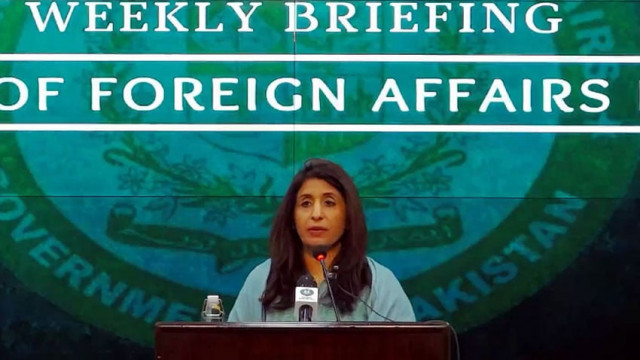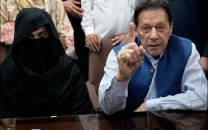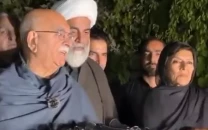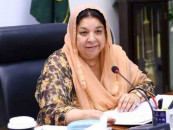Pakistan dismisses terror allegations
FO terms reference in India-US joint statement unwarranted

The Foreign Office on Friday strongly dismissed Pakistan-specific reference in the Indo-US joint statement as unwarranted, one-sided, and misleading as it also expressed concerns over transfer of advance military technologies to New Delhi.
“The reference is contrary to diplomatic norms and has political overtones. We are surprised that it has been added despite Pakistan’s close counterterrorism cooperation with the US,” a hard-hitting statement issued by the Foreign Office read after the Indo-US joint statement accused Pakistan of cross-border terrorism and use of terrorist proxies.
The joint statement was issued at the conclusion of Indian Prime Minister Narendra Modi's visit to Washington.
The joint statement said both Modi and Biden "strongly condemned cross-border terrorism, the use of terrorist proxies and called on Pakistan to take immediate action to ensure that no territory under its control is used for launching terrorist attacks".
"President Biden and Prime Minister Modi reiterated the call for concerted action against all UN-listed terrorist groups, including al-Qaeda, ISIS/Da’esh, Lashkar-e-Taiba (LeT), Jaish-e-Mohammad (JeM), and Hizbul Mujhahideen," the joint statement had said.
But the FO said Pakistan had rendered unmatched sacrifices in the fight against terrorism.
"In laying down their lives, our law enforcement agencies and armed forces have set an example. People of Pakistan are the real heroes in this fight.
“The international community has time and again recognised Pakistan’s efforts and sacrifices in the fight against terrorism. It has long concluded that terrorism can be defeated through concerted and cooperative actions.
"Today, we fail to see how the assertions made in the joint statement could strengthen the international resolve to fight terrorism. The statement shows that the cooperative spirit, so vitally needed to defeat the scourge of terrorism, has been sacrificed at the altar of geopolitical considerations," according to the statement.
It said in addition to being a state-sponsor of terrorism, India habitually uses terrorism bogey to deflect attention from its brutal repression of Kashmiri people in Indian Illegally Occupied Jammu and Kashmir (IIOJK), and maltreatment of its minorities.
It is thus completely ill-placed to caste any aspersions on Pakistan and its fight against terrorism.
"Ironically, the joint statement fails to address the key sources of tension and instability in the region and to take cognisance of the grave human rights situation in IIOJK. This is tantamount to abdication of international responsibility."
Pakistan is also deeply concerned over the planned transfer of advanced military technologies to India.
"Such steps are accentuating military imbalance in the region and undermining strategic stability. They remain unhelpful in achieving the objective of a durable peace in South Asia," the statement cautioned.
"We urge our international partners to take a holistic and objective view of the issues of peace and security in South Asia and refrain from endorsing one-sided positions.”
Earlier, the defence and foreign ministers too rejected the allegations levelled against Pakistan.
Foreign Minister Bilawal Bhutto Zardari insisted that the issue of terrorism must not be subject to geo-politics.
Reacting to the statement, Bilawal said he felt that Pakistan should be a bit at a distance from world politics.
“We should look inward and if we correct ourselves then we will be able to achieve our international targets,” he added.
“Pakistan is standing on its own strength and will continue to do so. Pakistan is the country which suffered the most by the terrorism and we have had far more casualties due to terrorism than India and the USA or any other country.
“We defeated these terrorists during our government of 2008-13. It is so unfortunate that terrorism has become an issue for us again because of the policies of Imran Khan.
“We think that the issue of terrorists must not be a subject of geo-politics. We can fight terrorism together in the world and it should not become an issue of geo-politics.”
While Bilawal was more diplomatic in his response, Defence Minister Khawaja Asif was blunt.
Asif took strong exception to the statement as he pointed out "the irony of this statement coming during the visit of someone who was banned entry to the US for overseeing a pogrom of Muslims when he was the Gujarat CM".
Lamenting the actions of Indian Prime Minister Modi in a tweet, the minister said: "He leads yet another campaign of state-sponsored terrorism in Kashmir, which includes routinely maiming and blinding the local population.
“Across the rest of the country, Modi’s acolytes lynch Muslims, Christians, and other minorities, with impunity."
The defence minister also stressed that "Pakistan has lost countless lives, and has been continuously at war with terrorism for decades now, owing to failed American interventions in the region".
"Perhaps President Biden should consider these facts the next time he fetes the Butcher of Gujarat," Asif said.
Washington wants India to be a strategic counterweight to China while Modi is seeking to raise the influence that his country, now the world's most populous, has on the world stage.
On the other hand, relations between nuclear-armed neighbours India and Pakistan have been fraught for years. Since British colonial rule in the Indian subcontinent ended in 1947, India and Pakistan have fought three wars, two of them over the Muslim-majority Himalayan region of Kashmir.
India has for years accused Pakistan of helping rebels who have battled Indian security forces in its part of Kashmir since the late 1980s.
Pakistan denies the accusation and says it only provides diplomatic and moral support for Kashmiris seeking self-determination.
The special status given to IIOJK was revoked in 2019 when New Delhi split it into two federally controlled territories. Pakistan calls the moves illegal and wants them rolled back.
India's decision led the two countries to downgrade their diplomatic ties.
Notably, the defence minister had previously said that Pakistan did not have any issues with the partnership between the US and India “as long as it does not come at the expense of Pakistan”.
In an interview with Newsweek, the minister emphasised the importance of maintaining positive relationships with neighbouring countries and regional partners, including India, particularly in the context of the Kashmir issue.



















COMMENTS
Comments are moderated and generally will be posted if they are on-topic and not abusive.
For more information, please see our Comments FAQ